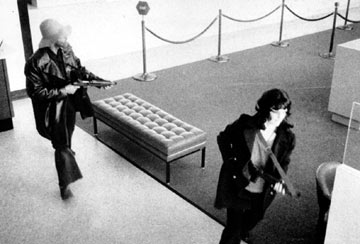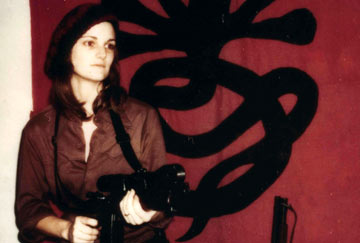

The strange saga of the Symbionese Liberation Army came to an end in 2002, when four members pled guilty to the 1975 killing of Myrna Opsahl. One of the members, Kathleen Soliah, was finally apprehended in 1999, living under the assumed name of Sara Jane Olson. She once was a revolutionary, but was now just an ordinary mother. These events served to remind everybody of the SLA, who kidnapped newspaper heiress Patty Hearst in 1974, then went on to terrorize the nation and feed a media frenzy. Robert Stone's (American Babylon, World War III) Guerrilla: The Taking of Patty Hearst tracks the SLA through two former members, Russ Little and Michael Bortin (who joined later) and gives a chronological account of their rise and fall.
Stone does a good job researching the information and presents it in a decent way, but there are two things hampering him. The first is that he only has two voices, that of Little and Bortin, both of whom distanced themselves from a lot of what happened. Little has a very good reason; he was in jail. Still, it does present a skewed version of events. Second, there is a lot of information already out there about the SLA, and the reemergence of Soliah a few years ago brought out even more. Guerrilla arrives in theaters a little late, after everybody may be a bit tired of hearing about them. But the fact remains that the SLA does pique the interest of many, mainly because of Hearst.
The SLA formed as a result of the Vietnam War. Growing up, they all heard about the heroism of the United States, liberating Europe in World War II. They saw US actions in Vietnam as completely hypocritical, and they advocated overthrowing the government. When Russ and an associate were jailed, the SLA responded by kidnapping Hearst. Among other things, the SLA forced her father, Randolph Hearst (son of legendary William Randolph Hearst) to feed the Californian homeless. The media ate it up. After all, an attractive, rich white woman was kidnapped, and the public wanted as much information as they could get. Things took a bizarre turn once Hearst changed her name to Tania and began espousing the views of the SLA. As most people know, she later claimed that the SLA brainwashed her.
The most fascinating aspect of this film is how Little and Bortin have changed over the years. They are now much more mellow, and worry about things like mortgages and their kids. Much like the ex-members in The Weather Underground, which could serve as a sort of companion documentary. With additional life experiences under their belt, Bortin and Little are clearly different people now than they were in the past.